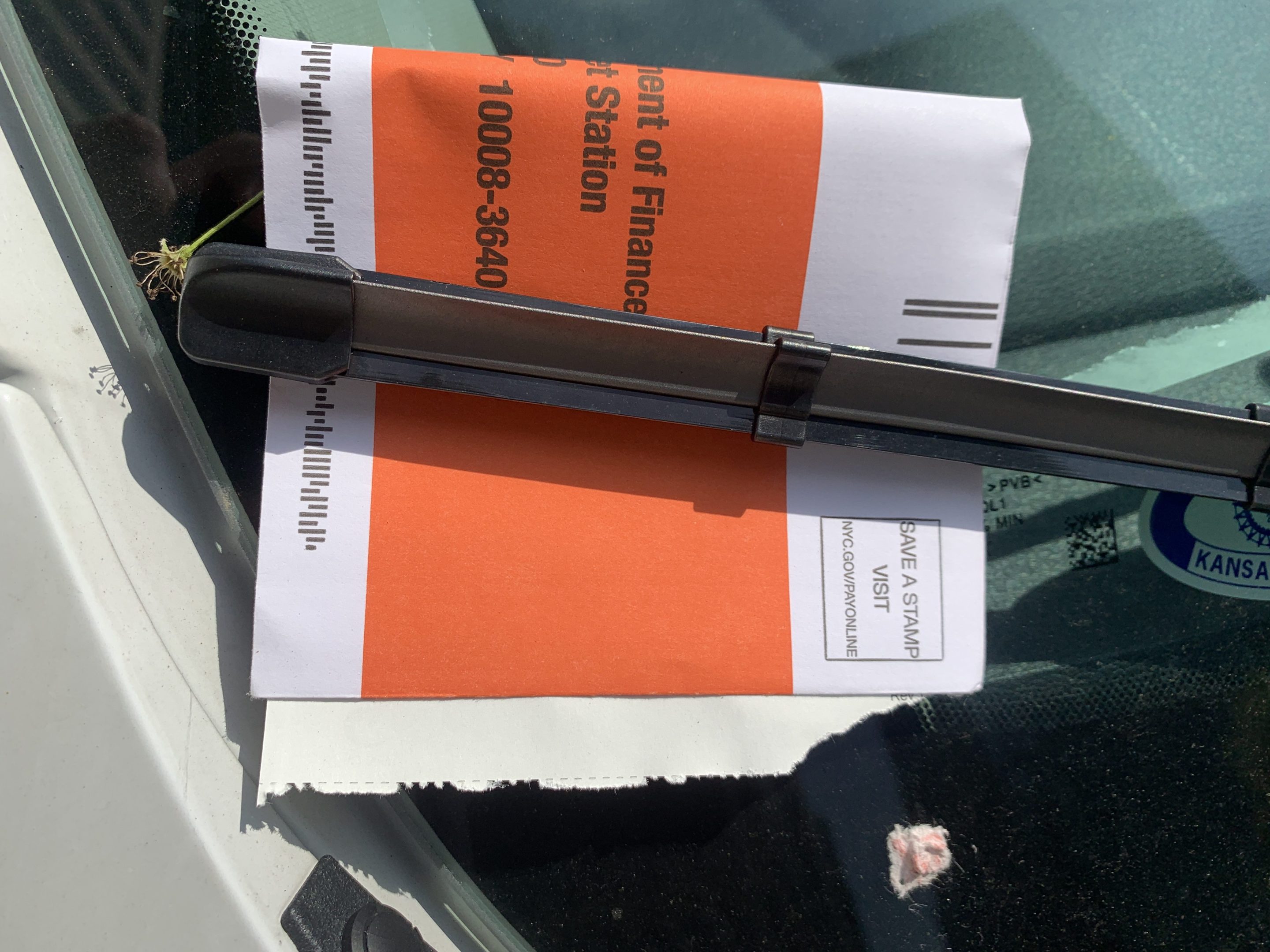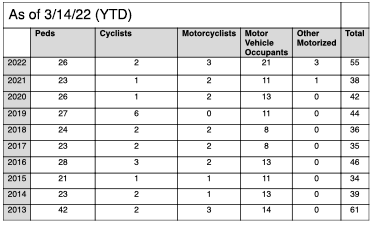Mayor Adams's sole safe streets announcement so far in his administration — a promise to protect pedestrians with a "relentless" effort by the NYPD — is just the same old fake crackdown.
New data released by the NYPD shows that the agency's vow to penalize drivers who fail to yield to pedestrians resulted in an increase of less than one failure-to-yield ticket per precinct per day in the month of February compared to January.
The numbers: In January, 2022, cops wrote 2,770 failure-to-yield tickets citywide, or one failure-to-yield ticket per precinct every day. By February — the first full month of the promised crackdown, cops wrote 3,899, which sounds like an impressive 40-percent increase, but amounts to just 1.8 failure-to-yield tickets per precinct per day.
Such a change hardly constitutes a new "focus" on safety enforcement that NYPD Commissioner Keechant Sewell promised on Jan. 19.
At that press conference at one of Brooklyn's deadliest intersections, Sewell promised that her city-sized army of cops would “strongly enforce” failure-to-yield violations with a “goal of doubling” such tickets in 2021, when the number of tickets written by cops dropped dramatically. Sewell added that the agency would not add officers to write more failure-to-yield tickets because, as she told Streetsblog, “every officer is going to be focused on it. When they see these infractions they will be enforced.”
Enforcement in other key areas has also not changed significantly, according to NYPD stats:
- Tickets for running red lights increased from roughly 1.1 on average per precinct per day in January to 1.4 per precinct per day.
- Tickets for violating bus or bike lanes increased from roughly one issued every 4.3 days per precinct in January to one every 4 days in February.
- Tickets for talking on a cellphone while driving increased from roughly one ticket issued every 2.4 days in January citywide to one ticket issued every 2 days in February.
- The number of tickets written to drivers who intentionally defaced or covered their license plate to avoid automated enforcement or toll collection actually dropped from a total of 229 tickets issued by cops in January citywide to 173 total in February.
The lack of truly enhanced enforcement of failure-to-yield has a direct effect on safety on the streets of the city, with 2022 starting out as the most deadly year since 2013. Between Jan. 1 and March 14, the Department of Transportation said 55 people died on New York City streets — 26 of them pedestrians. That's the highest number of deaths through this point in the year since 2013. And it's 44 percent higher than the same period last year.
And injuries to pedestrians are up nearly 50 percent this year, as Streetsblog has reported.
Nonetheless, the NYPD wrote just 44,769 total moving violation tickets in February, which amounts to just 20 summonses per precinct per day. By comparison, in January, 2022, each precinct, on average, wrote 16 moving violation tickets per day.
Comparing the numbers across history, the current crackdown continues to pale.
In February, 2019, for example, before the Covid-19 pandemic, the agency wrote 86,410 moving violation summonses in the month of February, or nearly 40 per day. And the agency wrote 4,850 failure-to-yield summonses, or 20 percent more than during the current supposed crackdown.
And the current crackdown has not, apparently, filtered down to some individual precincts in some of the most dangerous areas in town, according to the NYPD's own stats.
For example:
- In the 109th Precinct in deadly Flushing and College Point, Queens, which has had the third-highest number of pedestrian injuries so far this year, failure-to-yield tickets increased from just 3.2 issued per day on average in January to 4.0 tickets issued on the average day in January. And total moving violations increased from 19 per day in January to 22 per day in that sprawling area.
- In the 105th Precinct, which covers a strip of far Eastern Queens that has had the second-highest number of injury-causing collisions so far this year, the number of failure-to-yield tickets actually dropped from an average of 1.1 per day in January to an an average of .89 per day in February.
- In the 45th Precinct, which covers Williamsbridge and Wakefield and has had the most pedestrian injuries in the borough so far this year, total moving violations against drivers dropped from an average of 10 per day in January to 8.4 per day in February. The precinct's cops wrote a total of zero — 0 — speeding tickets last month.
The numbers reveal that it's foolish for anyone to expect that road safety will be achieved through NYPD intervention, activists said.
"The crackdown is kind of ridiculous," said Eric McClure of StreetsPAC, the city's only political action committee devoted to road violence. "If you stand at a single intersection, you could write as many failure-to-yield summonses in a day as a whole precinct writes in a month. It's obvious that the cops checked out on enforcement a long time ago."
McClure, a Brooklynite, cited the evidence he obtained during a recent visit to Manhattan: illegal plate covers are proliferating, drivers are operating their vehicles recklessly with seeming impunity, drivers will use gaps in protected bike lanes to maneuver around traffic (which he spotted in the portion of the Second Avenue bike lane near the Midtown Tunnel), drivers run red lights at almost every cycle.
"This is why we need to implement failure-to-yield cameras like they have in Washington, D.C.," he said. "We need to keep redesigning streets because we can't rely on NYPD to take enforcement seriously. If we're going from one failure-to-yield ticket to two, it's meaningless."
Jon Orcutt, a former DOT official who now advocates for Bike New York, added his own disappointment because he believes that strong enforcement could play a role in street safety.
"So much for hoping that fake traffic crackdowns would be a vestige of the de Blasio years," Orcutt said. "The early 2022 traffic fatality data suggests the Public Safety Mayor isn't going to be looking good at the end of his first year."
We reached out to the NYPD and asked whether the tiny increase in failure to yield tickets constituted the extent of the new "focus" that Commissioner Sewell had promised on Jan. 19. Here is police spokesman Sgt. Edward Riley's full statement:
This is a flawed way to determine failure to yield enforcement. The data you cite is a snapshot for that time period. More recent data shows we are continuing the trend of increased enforcement for motorists failing to yield to pedestrians. In the last 28-day period ending March 13 3,815 failure to yield to pedestrian summonses were issued versus 2,971 in the same time period last year, an increase of 28 percent. The NYPD looks to conduct enforcement equitably and conduct outreach and education to keep all involved safe.
The 3,815 failure-to-yield summonses for those 28 days represents an average of 1.7 failure-to-yield tickets per precinct per day, which is actually fewer than the average summonses written by police in February.







